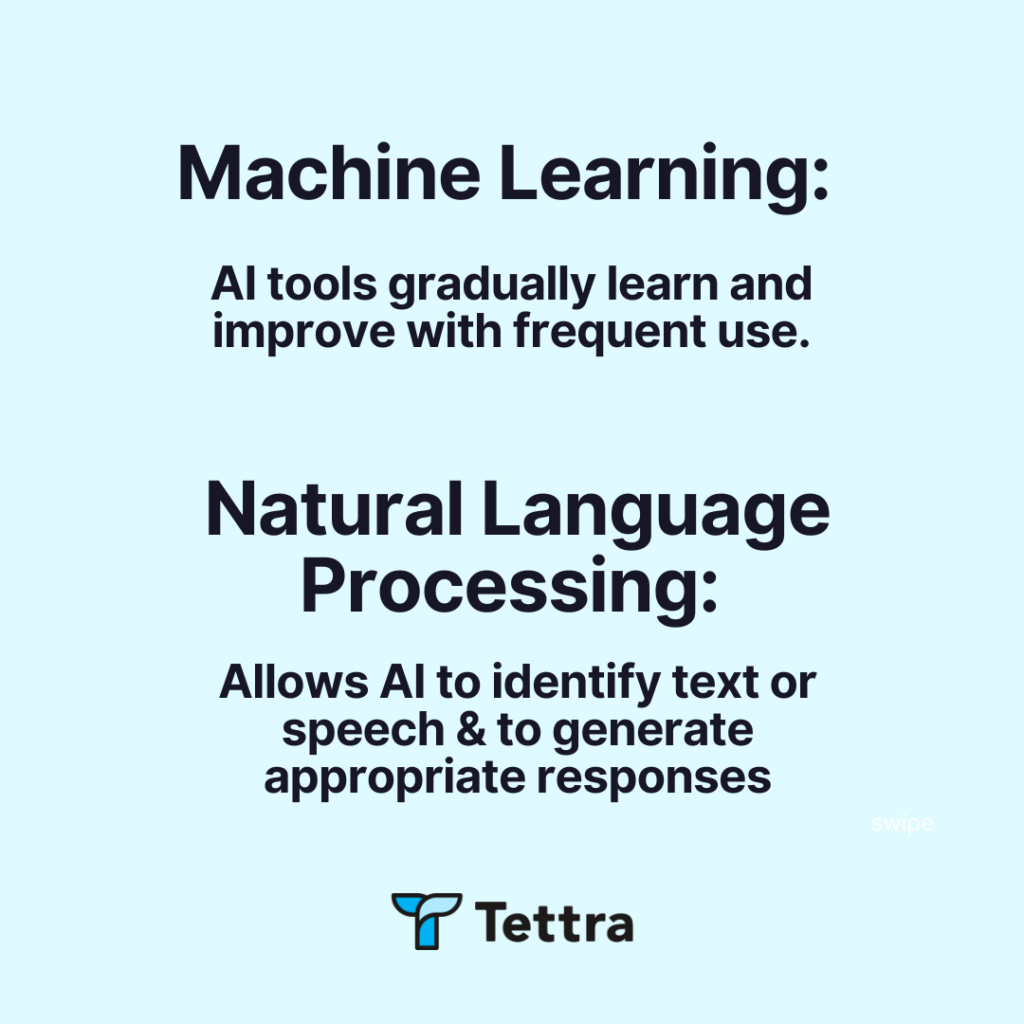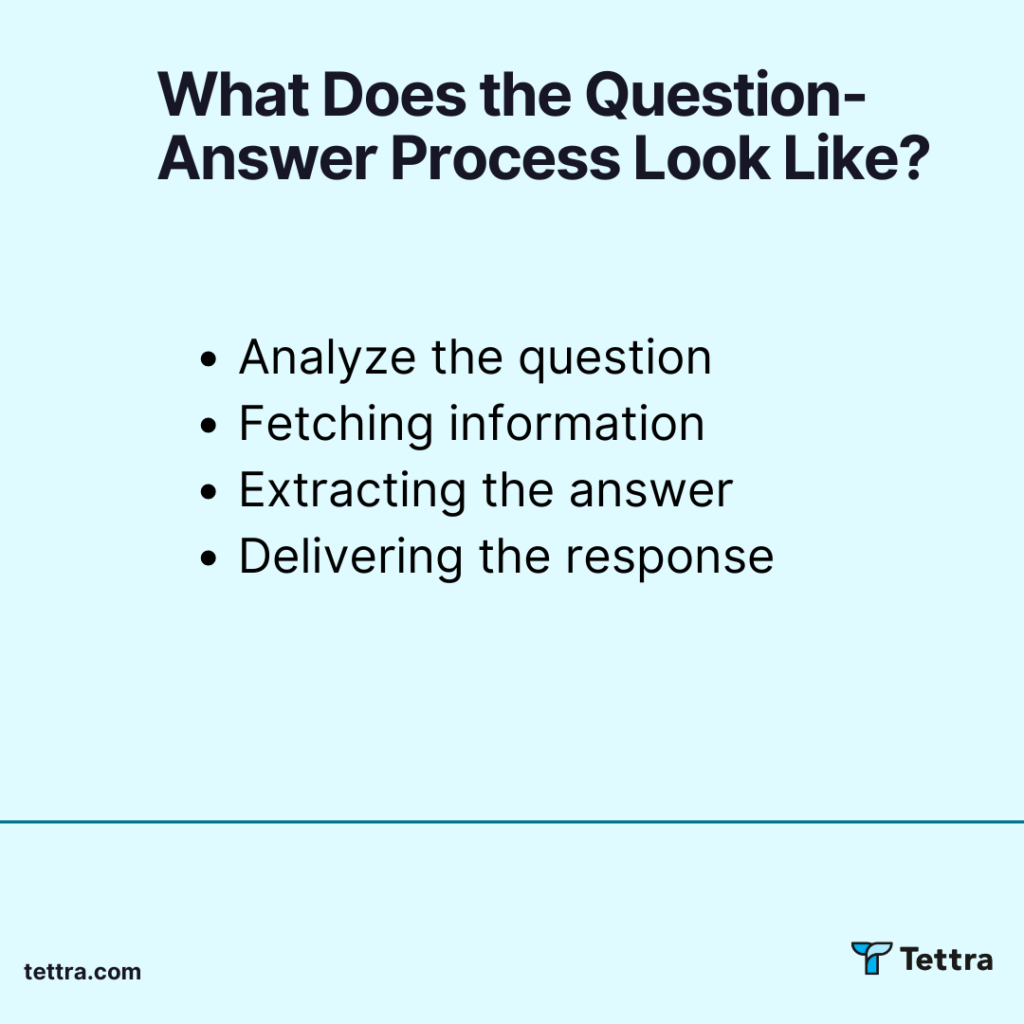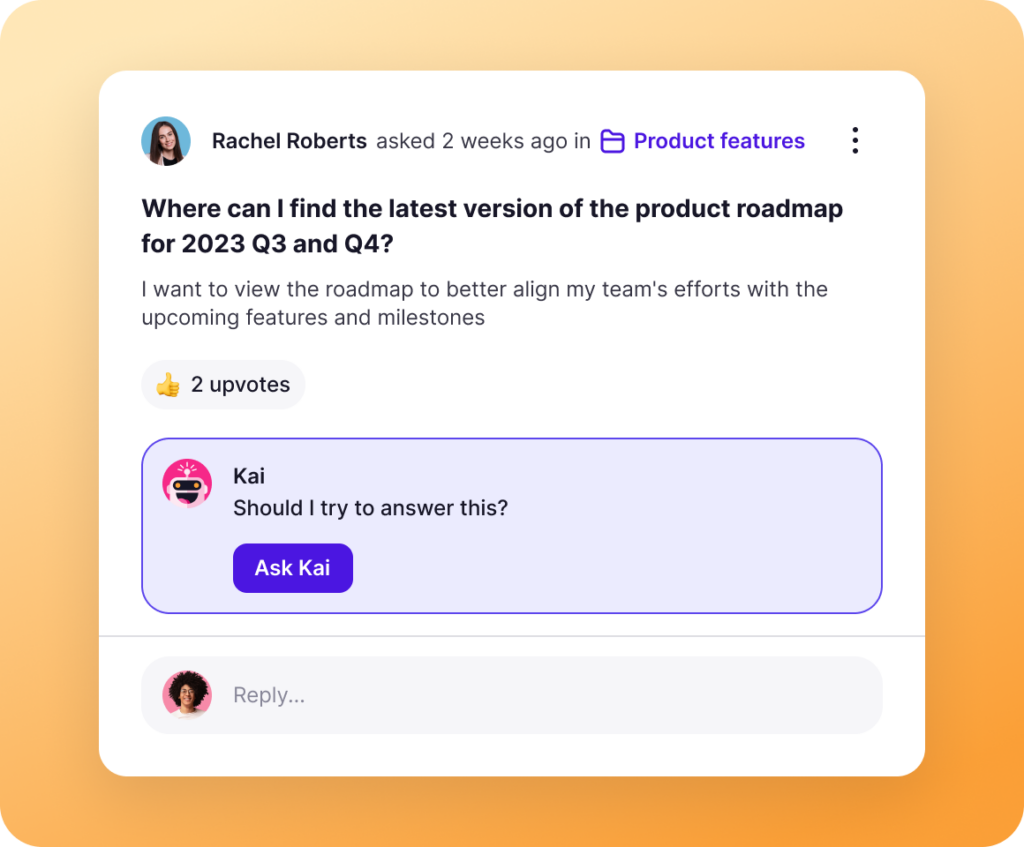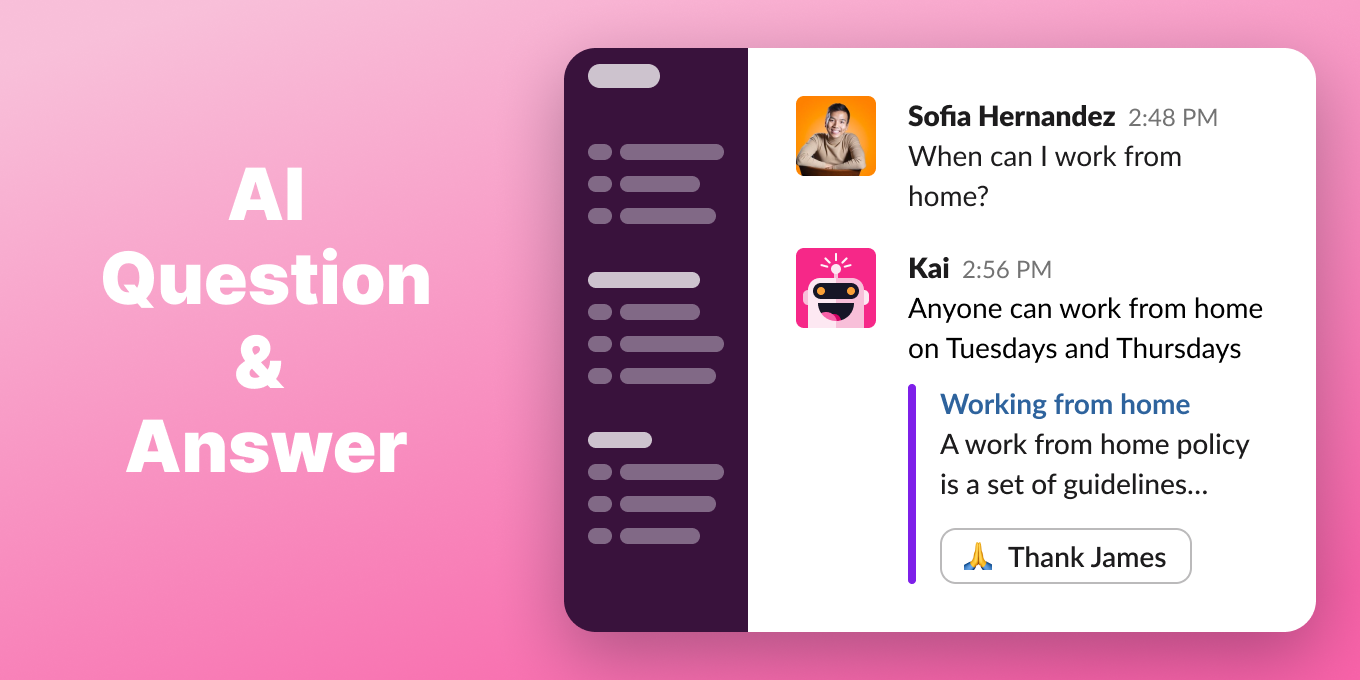- “Hey, [AI], how much wood would a woodchuck chuck if a woodchuck could chuck wood?”
- “What is the recipe for traditional Italian lasagna?”
- “Can you give me the key insights from this Slack conversation?”
The first question aside, it’s pretty critical for AI question-answering tools to provide accurate, concrete responses to most of your inquiries.
Otherwise, you could end up with a strange, soupy dish or, worse yet, an inaccurate assessment of a significant business conversation.
We have so many excellent AI-driven question-answering tools that can handle versatile inquiries with the utmost ease.
They can give you factual information.
They can offer advice.
Correctly summarize books, essays, emails, and team Slack messages.
See how Tettra turns your Slack convos into re-usable company knowledge:
While AI technology is relatively new, we’ve already grown quite accustomed to it. But how does this tech work? How can AI read your question, interpret it, and provide a comprehensive response?
Let’s find out.
AI Question Answering at a Glance
AI question answering is a complicated topic.
Even in human-to-human interactions, the simple act of asking and answering a question can be riddled with challenges. While we do this every day, it’s a complex, nuanced process that even we haven’t fully mastered. Hence why we often encounter issues with misinterpretation and misunderstandings.
Comprehending the question, using background knowledge to figure out whether you have the correct information, and providing a relevant response are not easy tasks – but they’re the same tasks that both humans and AI tools have to go through when answering questions.
The difference is in how they go through these tasks.
The Basics of AI Responses and Question Interpretation
AI platforms for answering questions need to use a combination of complex algorithms that let them comprehend the question and its context and provide a sensical response.
Most notably, these tools rely on Machine Learning (ML) and Natural Language Processing (NLP) to hold conversations with humans.
- Machine Learning algorithms allow AI tools to gradually learn and improve with frequent use. Each interaction it has with a human serves as a learning opportunity. If the tool misinterprets a question, it learns how not to do it the next time. If it provides an inaccurate answer, it learns not to repeat the mistake.
- Natural Language Processing is the other side of the coin. It’s what gives AI tools the ability to identify and understand spoken and written speech and allows them to generate appropriate responses.

Natural Language Processing (NLP) as the Key Element
Without NLP, there would be no proper way for two-way interactions between humans and AI.
Natural language processing (NLP) algorithms allow AI tools to identify verbs, nouns, and other parts of speech. They enable these tools to understand linguistic nuances, idioms, and unique idiosyncrasies that shape the human language.
Most importantly, NLP distinguishes advanced AI question-answering tools from common chatbots that provide solely pre-written responses.
Natural Language Processing is the heart and soul of every sophisticated AI tool and the key to enabling comprehensive, sensible, two-way communication between humans and the tools in question.
Question Types AI Can Work With
So, thanks to ML and NLP, AI software tools can communicate with humans – but what kinds of questions can they actually answer? That mainly depends on the specific tool and the knowledge base it relies on.
Tools with a smaller database that focuses on a single topic will only be able to provide relevant answers.
For example: Let’s say you were using an AI tool provided by a weather station. It would likely be able to solely answer questions related to the weather.
On the other hand, tools that are incorporated into your company’s knowledge management bases, for instance, will likely be able to provide more versatile answers regarding company policies, clients, current projects and more.
That said, most tools can handle simpler, factual questions and multi-faceted, open-ended ones.
The Inner Workings of AI-Driven Question Answering Tools
We now know that AI question-answering involves using knowledge bases, Machine Learning, and Natural Language Processing.
The question is, how does it all work together?
The first element that steps into the spotlight is NLP.
It breaks down the question (in a process known as tokenization) to identify the most critical parts of your sentences and better understand your meaning.
Then comes the knowledge base – aka all the data that an AI tool has access to.
Depending on the tool, the database can be highly structured (commonly used in businesses), unstructured (coming in the form of documents, images, audio files, and more), or a combination of both. The more extensive the database, the more information the AI tool can fetch from it.
Lastly, it’s time for ML to step in. It’s used to recognize patterns and provide better contextual responses. If multiple users tend to pose the same follow-up questions, for instance, the AI tool can learn to immediately give more comprehensive answers without being prompted thanks to ML.
What Does the Question-Answer Process Look Like?
Though AI question answering is a complex process, it can be quickly summarized into just a few steps:
- Analyzing the question – identifying the meaning of the question and the main topic
- Fetching information – going through the database to find relevant information
- Extracting the answer – finding concrete answers from the information pool
- Delivering the response – combining all structured and unstructured information and presenting it in a manner that’s easy for the user to understand.

Depending on the tool used, the database it has access to, and the question posed, you might experience a bit of a lag until you get a response. Most commonly lasting just a few seconds, AI tools still take time to go through all these steps and deliver accurate answers.
Top AI Platforms for Answering Questions
AI tools used for answering questions come in all shapes and sizes. Have a look at some of the most popular ones:
- ChatGPT – arguably the best-known tool, it was launched by OpenAI in 2022. It’s most commonly used for producing written content, writing emails, code, social media posts, and more;
- Tettra – integrates with platforms like Slack to automatically answer repetitive questions from your team and company docs. It can also generate new knowledge base articles based on your team’s Slack conversations
- Guru – a popular business tool, it’s designed to integrate into a company’s workflow and offer employees easy access to information;
- Ask AI – similar to Guru, it’s a business tool designed to simplify knowledge management and integrate with local knowledge bases.

Features That Define AI Question Answerers
Though AI-powered tools frequently come with a long list of versatile capabilities, there are a few defining features that all question answerers need to have.
Language Processing
Processing and understanding written (and, depending on the tool, spoken) language is the key to making an AI question answerer functional. It doesn’t only let the tool understand your inquiries, but it also helps it form more conversational responses that feel more natural and human-like.
Contextual Awareness
Context awareness in AI is the key to positive AI-human interactions. It enables the tools to have a natural conversation flow and keep communication smooth and efficient. Contextual awareness also helps these tools use previous interactions with the same user for a more personalized and relevant experience.
Multi-Turn Conversational Capabilities
Multi-turn conversations allow AI tools to keep communication open and continuous. It’s what will enable you to post follow-up questions and get clarifications without having to repeat your initial inquiries over and over again.
Multilingual Support
Most AI tools are mainly trained in English and tend to deliver the best results in this language. Still, the best ones offer multilingual support, allowing as many users as possible to hold conversations and ask questions in their native language.
AI Question Answering Use Cases
Though it’s undoubtedly impressive what AI tools have become capable of in a short period, it begs the question – when would we use them? What are the applications of AI question answerers?
Unsurprisingly, these tools have already found many use cases:
- AI in customer support – AI tools are faster and arguably more effective at providing answers to common customer questions than human support agents;
- AI in business – from streamlining knowledge management to simplifying collaboration, assisting the L&D processes, and more, AI has already found many uses in businesses across niches;
- AI in education – these tools can assist students and employees gain quick access to relevant information when needed. More importantly, they can quickly break down complex study materials into chunks of information that are easier to dodgers;
- AI in research – AI can parse through expansive databases within seconds, helping researchers find information faster than ever before;
- AI in personal assistance – AI digital assistants can easily keep track of reminders, manage schedules, answer questions, and streamline daily tasks.
These are just some of the most common applications of AI question answerers. These tools can be used in virtually any industry or niche, ensuring everyone has access to relevant information if and when they need it.
What AI Platforms for Answering Questions Offer
So, AI tools have many applications and use cases, but are there any concrete benefits of AI question-answering?
A few immediately come to mind, especially in business environments:
- Minimized response times – AI can offer instantaneous responses to both employees and customers. They don’t have to wait around for a human to see their question, research the response, and get back to them;
- Improved availability – AI tools don’t have specific office hours. They don’t take breaks or time off. They’re available 24/7/365, regardless of the time zone they’re in;
- Minimized errors – these tools won’t overlook an essential part of the question or relay incorrectly memorized information. They’ll deliver consistent, accurate responses every time;
- Easier scalability – an AI tool can handle multiple conversations simultaneously, having different conversations with each user simultaneously. This simple feature makes it easier for businesses to scale up and handle the ever-growing influx of customers and employees who need assistance.
As these tools become more sophisticated, the list of benefits will just continue growing.
Most Common Issues You Could Encounter
While they’re certainly helpful, AI question answerers aren’t all-powerful. You should still be prepared to tackle some of the most common challenges that come with them:
- Data accuracy – AI tools will provide answers by reviewing the information in the database(s) they can access. If the database contains incorrect information, the AI tool will have issues with data accuracy;
- Privacy and security – AI tools frequently handle sensitive information, so privacy and security are a big concern. It’s essential to up the ante on cybersecurity and ensure a strong IT infrastructure. Moreover, you’ll need to ensure that these tools handle sensitive data carefully and comply with all relevant privacy regulations and policies;
- Ethical issues – it’s critical to use transparent algorithms to avoid biases and discrimination and ensure that AI tools have fair treatment of all users;
- Bias concerns – if there are any biases in the data used to train AI models, the AI tools themselves will have biases, which can affect response accuracy and fairness.
Generally, most of these challenges can be overcome by ensuring the utmost data quality in your knowledge bases and building up a strong IT infrastructure.
Things to Expect Down the Line
AI question answerers are still in their infancy. Still, the future of AI in knowledge management is already looking bright:
- Expanding capabilities – with advancements in ML and Deep Learning, NLP, and other technologies that drive AI, these tools are set to have expanding capabilities that will make them more accurate and useful in the coming years;
- Improved responses – at the moment, developers are prioritizing improving AI accuracy, eliminating biases, and developing algorithms that will enable tools to handle more complex queries;
- Deeper industry penetration – many businesses already rely on AI tools for enhancing their knowledge management. However, over the coming years, we’ll see them become more commonplace in healthcare, education, hospitality, and more.
Time will only tell where AI question answerers are heading considering that many tools are already quite advanced as is.
Learn more about knowledge bases and AI questions:
- 11 best AI tools for business
- What is a company knowledge base?
- Internal vs external KB and why you need both
- 5 reasons why your company needs a knowledge base
- 9 top AI knowledge base software
- 11 best knowledge base software to check out
FAQ
How do AI tools find responses to questions?
AI tools have access to specific databases that they can pull information from. They use NLP to assess the key point of your question and then use this information to scour through the database and find relevant responses. Whether they can find the answer to your question depends entirely on the information in the database.
What is AI bias?
AI bias refers to the instances where the tool offers biased or inaccurate responses because the database it has access to contains skewed information. In a sense, it’s the result of human error. If the humans creating databases had prejudices or stereotypes, they will be transferred to the AI that uses those databases to offer responses.
Can I use AI question answerers for free?
Some AI question answers, like ChatGPT, are available for free. Dedicated solutions designed to integrate with your company’s databases are commonly paid options.
Are AI tools accurate?
Whether AI tools offer accurate information depends entirely on the database they use. The AI tool will provide accurate responses if the database is accurate and error-free.


